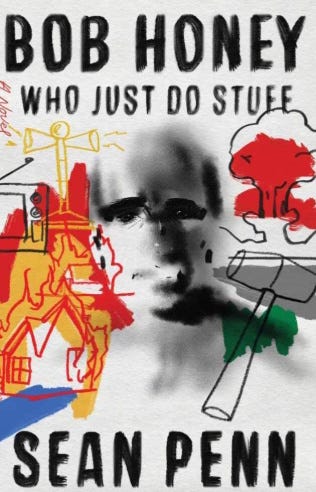In a 1991 Vanity Fair review of American Psycho, Norman Mailer wrote: “(Bret Easton Ellis) has an implicit literary right, obtained by the achievements of every important and adventurous novelist before him, to write on any subject, but the more he risks, the more he must bring back or he will leach out the only capital we have, which is our literary freedom.”
It’s a fine point - if you want to be edgy and weird, go ahead, but you better be good too. Some wily provocateurs have found short cuts around this dilemma via the cultural divide, so that a comedian who delivers a bad joke can blame a “woke” audience. But Mailer’s warning stands, as we’ve seen stand up comedy devolve to a coven of bootlicking podcasters and celebrity shills.
Credit Sean Penn at least for clearing out those safety mats - his 2018 novel Bob Honey Who Just Do Stuff riled up any and all sides, its “gleeful racism and misogyny” according to an oft quoted Huffington Post review balanced with its vitriol at “the violently immature seventy-year-old boy-man with money and French vanilla cotton candy hair” whose 2016 election backdrops its second half.
But is it good? No, said critics and amateur reviewers, who took their turns in a book chat stomp out. Under most one star comments you’ll find the common phrase, “Worst book ever.” People were predisposed not to like this actor’s literary foray, and Bob Honey is rife with bad optics to support that view. It does evince an odd view of women, not defendable in the context of any coherent story, as Bob Honey’s hated ex-wife is an ephemeral avatar and his younger ex-girlfriend exists mostly as a voice in his head. And there are some real doozies of bad decisions, in the all too common alliteration and the horrid final poem including the lines: “was it really in our interest/ to trample Charlie Rose?/ And what’s with this ‘Me Too’?” Yes, that’s bad.
Nothing about the book makes much sense. Bob Honey is evidently a world traveler, with a septic tank business that takes him to Iraq in 2003, along with a list of foreign locales (Syria, Moscow, Rwanda, etc) revealed in an interrogation after a scuba diving trip runs afoul in international waters. In another bad narrative decision, he has a side gig as an elderly assassin, a nonsensical plot element that does nothing for the book except to devalue our trust in it.
Somehow Bob is also a suburban shut in, drawing the ire of his California neighbors. All of this is rendered flippantly, as opposed to say the discourse on the marble of his bathroom as he sits on the toilet, or a grilled cheese lunch: “His incisors make a surgical entry, initiating a delicately inconspicuous cut through the toasted buttery carapace.”
At one point Bob recalls his visit to the Katrina wreckage in 2005, and we recognize bias intruding, because we know Sean Penn famously aided in the rescue efforts. Just as we know him to be a cranky pundit, his stern sermonizing putting off even those inclined to agree with him. We can envision another novel playing with those preconceptions, but Penn has chosen a more difficult route, leaning on the odd prose style to carry the burden of its narrative flights.
And sometimes, it works. Musing on the Trump delusion: “Between the id and the superego, the sheep had traded a love of their own children for the chance to cry, ‘Look at me! I’m a pisser on a tree!’ Ouch goes the human heart.” Or the riff on being as branding, or the septic tank bit which could have been expanded to fit the book’s cynicism, if say Bob Honey got rich off shit just as America embraced it as an ideology via Trump. It doesn’t shy away from that pulse, of national decline and all the ensuing chaos and paranoia, America described as “the ghost of a girl he’d never known.”
But we can’t judge the book on what it isn’t any more than on who Sean Penn is. Bob Honey Who Just Do Stuff is a stylistic exercise that most writers would have left in the trunk, willingly or not. Still, the style is there, and the ideas are too. There’s a difference between attempting an offbeat style, and hiding behind it. Say this for Bob Honey - it’s not hiding. And truthfully the worst stuff like that grilled cheese bit is not indicative of its style, which clunky as it can be is sustained, and never flat. I actually found it engaging, as I do any book which carries a current of the writer’s spirit, of what they were trying to do.
So we return to Mailer’s quote, and in that sense Penn has done no damage. If his novel has ruined anything, it’s the efforts of future celebrities in their literary efforts. They will be compared to Bob Honey, “the worst book ever written.” Is it though? Absolutely not. “Criminal crumbs and corresponding celebrity crusts, bound together by dough” is not Finnegans Wake but what is? That Penn took a big swing for Joyce or Pynchon and didn’t totally miss is admirable to me.





